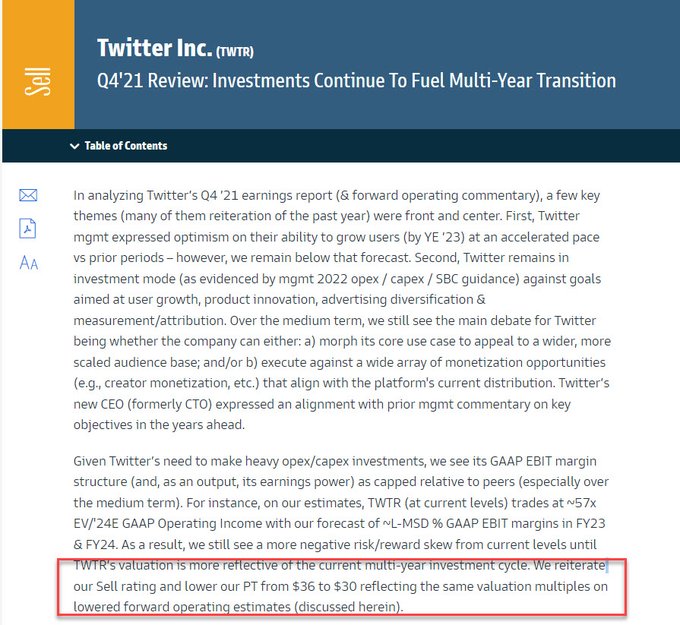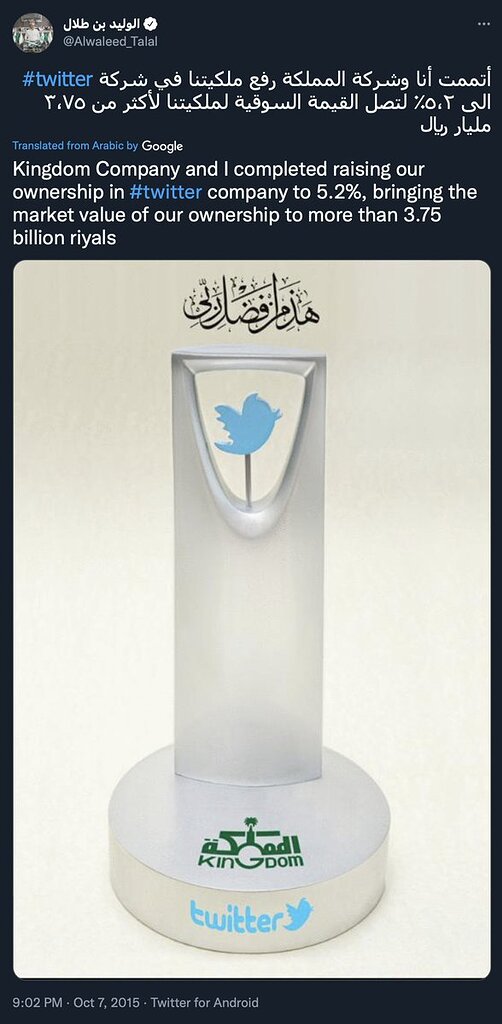
Suit against Musk
This may show others that hit the radar:
From Twitter’s most recent (fiscal year 2021) 10K/Annual Report [PDF], filed 2022-02-16.
Revenue
- Advertising services 89%
- Data licensing and other 11%
Advertising Services
We generate most of our advertising revenue by selling our Promoted Products. Currently, our Promoted Products consist of the following:
-
Promoted Ads and Twitter Amplify. Promoted Ads (previously branded as Promoted Tweets), which are labeled as “promoted,” appear within a timeline, search results, profile pages, and Tweet conversations. Using our proprietary algorithms and understanding what is relevant to each account, we can deliver Promoted Ads that are intended to achieve the outcome that the advertiser is seeking. We enable our advertisers to target an audience based on many criteria. Our Promoted Ads are pay-for-performance or pay-for-impression delivered advertising that are priced through an auction. Our Promoted Ads include objective-based features that allow advertisers to optimize for the goal selected by the advertisers, such as Tweet engagements (e.g., Retweets, replies and likes), website traffic, mobile application installs or engagements,obtaining new followers, or video views.
-
Follower Ads. Follower Ads (previously branded as Promoted Accounts), which are labeled as “promoted,” provide a way for our advertisers to build and grow an audience that is interested in their business, product or service. Our Follower Ads are pay-for-performance advertising priced through an auction.
-
Twitter Takeover. Twitter Takeover (previously branded as Promoted Trends), which are labeled as “promoted,” appear at the top of the list of trending topics or timeline for an entire day in a particular country. We sell our Twitter Takeover on a fixed-fee-per-day basis.
While the majority of the Promoted Products we sell to our advertisers are placed on Twitter, we also generate advertising revenue by placing advertising products that we sell to advertisers on third-party publishers’ websites, applications or other offerings.
Data Licensing and Other
We generate data licensing and other revenue by (i) offering data products and data licenses that allow our data partners to access, search and analyze historical and real-time data on our platform (which consists of public Tweets and their content), and (ii) until the completion of its sale on January 1, 2022, providing mobile advertising exchange services through our MoPub exchange. Our data partners generally purchase licenses to access all or a portion of our data for a fixed period. We recognize data licensing revenue as our data partners consume and benefit from their use of the licensed data. In addition, through December 31, 2021, we operated a mobile ad exchange and received service fees from transactions completed on the exchange. Our mobile ad exchange enabled buyers and sellers to purchase and sell advertising inventory and matched buyers and sellers. We have determined we were not the principal as it relates to the purchase and sale of advertising inventory in transactions between third-party buyers and sellers on the exchange. Therefore, we report revenue related to our ad exchange services on a net basis
Saudi prince Alwaleed Talal, Chairman of Saudi-based Kingdom Company, a large Twitter shareholder, just announced rejection of Musk’s offer.
Kingdom Company presumably has the assets to make a counteroffer >$54.20.
Here is Elon Musk live at TED Vancouver 2022 a few hours ago.
On Twitter: “Open source the algorithm, make all promotion and demotion of posts and posters transparent.”
Thanks for digging out that information, Mr. W.
Back in MBA days, the professor in charge of the advertising course explained the challenge of getting one’s money’s worth from advertising – 90% of all advertising is wasted; the problem is we don’t know which 90%.
But spare a thought for the San Francisco snowflakes at Twitter Central. On the plus side, they won’t be bought out by Musk and given a non-negotiable offer of a 50% pay cut to move to their new show-up-every-day work location in Texas. On the minus side, they now know they work for those beheading women-wrapping Saudis. There is a God!
Any chance that Mr. Musk’s Plan B involves setting up an Anti-Twitter, with no censorship, lower overhead, and cheaper advertising rates?
At 27:00 in the TED interview he speaks explicitly about being blackmailed by the SEC and banks over the earlier offer to take Tesla private. “I was forced to concede to the SEC, unlawfully—those bastards—and now they’ve made it to look like I lied when I did not, in fact, lie.”
This reminds me of The 90s when “we were living on Internet Time”.
Today, Elon warped time!
Coincidentally, the taking Tesla private tweet involved hypothetical Saudi funding.
…“titanic in scale”. Interestingly, the Titanic struck the iceberg on 1912-04-14, 110 years ago to the day.
@johnwalker, If the board believes that the actual value is greater than $54.20 per share, do they have a fiduciary duty to engage in a stock buyback at the current lower price?
All of my knowledge of U.S. takeover law and regulations is at least 30 years out of date, and in addition I don’t know what anti-takeover measures the board may have previously adopted or are implied by the Delaware corporate code that may affect the handling of a bid.
In the old days, a corporate buccaneer would simply file a public tender offer to all shareholders to buy their stock for a fixed price by a defined closing date, with the offer expiring if the requested number of shares were not tendered in time. This is rarely done today, with most deals being done at the board level with entanglement of anti-takeover measures, “poison pill” provisions by the target, and complex leveraged financing arrangements or stock payments on the part of the acquirer. Elon Musk is one of the few people who could actually mount a pure cash tender offer, in which case the board’s role would simply be to recommend whether shareholders accept or reject it.
Generally, there’s pretty broad discretion for boards in takeover negotiations, although just about any decision they make is going to end up the object of shareholder suits filed by the San Diego contingency fee guys on behalf of one or two cat lady shareholders representing the class of everybody who owns the stock.
The Twitter Board of Directors has adopted a “poison pill” provision, euphemistically called a “shareholder right plan”, as described in this press release dated 2022-04-15, “Twitter Adopts Limited Duration Shareholder Rights Plan, Enabling All Shareholders to Realize Full Value of Company”.
The Rights Plan is similar to other plans adopted by publicly held companies in comparable circumstances. Under the Rights Plan, the rights will become exercisable if an entity, person or group acquires beneficial ownership of 15% or more of Twitter’s outstanding common stock in a transaction not approved by the Board. In the event that the rights become exercisable due to the triggering ownership threshold being crossed, each right will entitle its holder (other than the person, entity or group triggering the Rights Plan, whose rights will become void and will not be exercisable) to purchase, at the then-current exercise price, additional shares of common stock having a then-current market value of twice the exercise price of the right.
Details of the scheme are to be described in a Form 8-K filing with the Securities and Exchange Commission (SEC). As of 19:13 UTC on 2022-04-15, no such filing is listed in the SEC database.
This is one of those anti-shareholder rights provisions which give U.S. corporate governance its well-deserved reputation as being worthy of an empire of almost a third of a billion grifters. Basically, what “shareholder democracy” means in that jurisdiction is that it’s perfectly fine for a corporate board to, should any investor of whom they disapprove acquire 15% or more of the company’s shares, to issue new shares to all of the other existing investors but not the takeover whale, diluting their investment and effective stealing the value of the investment they dislike.
Isn’t this also tanking the share price, given the EPS is effectively nearly halved? So if the market remains rational (haha, I know, right?) you would expect the PE ratio to track nearly constant absent any other material events?
The equal opportunity ambulance chasing attorneys looking for class action lawsuits are probably licking their chops and chanting “do it, do it, do it…”
The share price will fall due to the dilution, but since all of the non-hostile shareholders receive extra shares, the value of their investment is unchanged. This is exactly like a stock split, except there is discrimination against the person attempting the acquisition, who is diluted without compensation. I would think that the investor whose pocket was thus picked would have a cause of action against the company (and maybe they do), but this gimmick has apparently been used by other companies without the SEC intervening.
Why does the Board not approve the transaction? Is it because Elon Musk is technically an African-American? The potential for discrimination is unacceptable! This would make a great Supreme Court case – if the US actually had a Supreme Court.
Just a random thought – what if Mr. Musk got four of his friends to proceed independently, quietly buying shares until they each had something below the 15% share limit but collectively the five together had more than 50%? Then simply vote the Board out and fire all the executives; hire the nastiest lawyers to check every expense claim & every business decision the Board & executives ever made, and pursue any questionable acts in civil & criminal proceedings; throw out the poison pill; and offer the other shareholders a fair price to take Twitter private.
I haven’t seen the details of the provision adopted by the board (which hasn’t yet been filed with the SEC on an 8-K), nor am I familiar with securities statutes and case law regarding such deals, so this is just speculation. There may be some kind of provision about “structuring” of transactions to avoid concentration in the same way that breaking up cash transactions into tranches small enough to evade bank reporting requirements is criminal. But they may not have plugged that hole.
An interesting speculation I saw earlier today is that one of the reasons Twitter may have denied Musk a seat on the board and resisted the takeover so vehemently is that once he is empowered he could bring a proxy vote on forcing Twitter to disclose all of their actions in shadow-banning, wiping followers, and otherwise discriminating on content which would expose perjury by senior executives including former CEO Twitter Homeless and Twitter Apu under oath in congressional testimony. If the present situation ends up in court, it will be interesting to see if Musk can compel disclosure of such information as part of discovery.
And then we have this: New York Post: “Elon Musk considering bringing in partners on Twitter bid, sources say”.
Elon Musk is speaking to investors who could partner with him on a bid for Twitter, sources close to the matter told The Post.
A new plan that includes partners could be announced within days, those sources said.
One possibility, the sources said: teaming with private-equity firm Silver Lake Partners, which was planning to co-invest with him in 2018 when he was considering taking Tesla private.
⋮
Twitter hasn’t yet filed its shareholder rights plan with the SEC, though it announced the poison pill in a statement. The SEC filing will give more details on whether it prevents like-minded investors from teaming to buy a greater than 15% stake.
